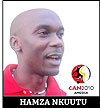Just after three days, the 2010 African Cup of Nations in Angola promises to be the most unpredictable competition in recent years. The state of pitches won’t make life any easier for the big boys whose game rotates around passing the ball on the ground rather than kicking it from defence to the strikers.


Just after three days, the 2010 African Cup of Nations in Angola promises to be the most unpredictable competition in recent years.
The state of pitches won’t make life any easier for the big boys whose game rotates around passing the ball on the ground rather than kicking it from defence to the strikers.
Even on TV you can easily see that teams are struggling to put a couple of good passes together as was the game with Mali, especially in the first 70 minutes against Angola, Algeria against Malawi as well as Ivory Coast in their goalless draw with Burkina Faso.
Togo’s withdrawal from the tournament was first and foremost the most fickle thing to come out this year’s competition. No one saw it coming until rebels opened fire on the team’s convoy on Friday, two days before the tournament was scheduled to kick off.
Just when news of Togo’s demises was still very fresh on everyone’s mind, host nation Angola threw away a four-goal lead to settle for a 4-4 draw against Mali in the opening fixture. Leading 4-0 with eleven minutes remaining, Angolans knew that was game over and won yet Mali had other ideas. No one saw that coming.
On day two, Malawi, clearly the underdogs against World Cup bound Algeria, defied odds and pulled off a miraculous 3-0 win. Again, no one saw that one coming.
In the day’s second game, Ivory Coast, star-studded, bound for 2010 Word Cup in South Africa and one of the tournament favourites, along with Ghana, Egypt and Cameroon, could only manage a 0-0 draw against little fancied Burkina Faso. So unpredictable!
The Nations Cup has always been an unpredictable tournament where each team is capable of beating the other but this year’s could turn out to the most explosive in recent years.
It’s unfortunate that the Cecafa region is not represented in Angola, the nearest to representing the region, which has for years lacked enough representation at major competitions is Malawi and Zambia, and both of whom are rank outsiders to go all the way to the top prize.


